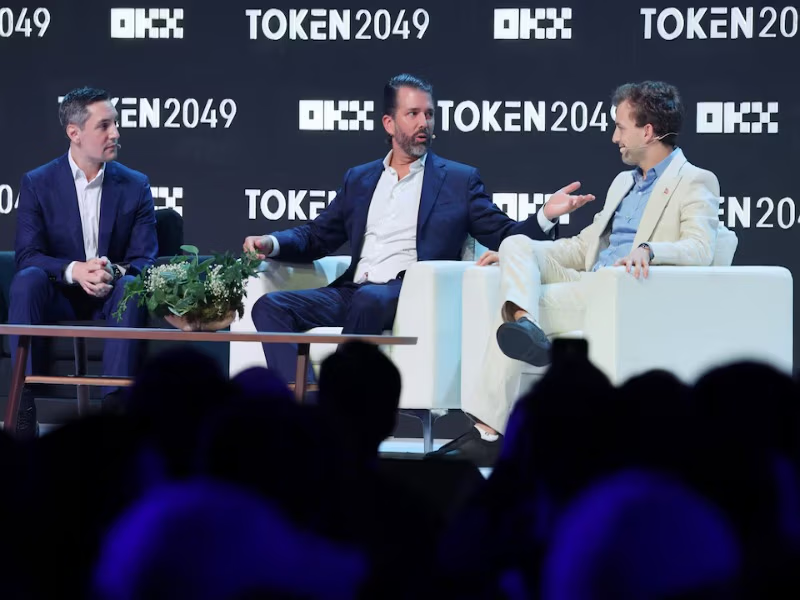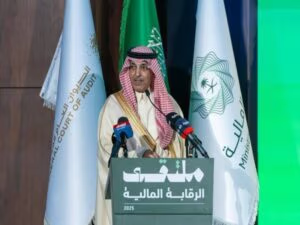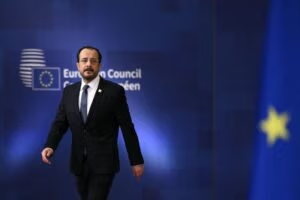World Liberty Financial is moving further toward mainstream adoption of crypto by intending to launch a debit card and to offer tokenized trading of commodities.
Addressing the Token2049 conference in Singapore, Trump Jr. and CEO Zach Witkoff described a radical expansion that would connect crypto assets to the daily expenditure and oil, gas, and agricultural commodities to blockchain trading.
World Liberty Financial has just dropped its most ambitious expansion plans ever, and the timing could not have been more strategic.
The CEO Zach Witkoff and the co-founder Donald Trump Jr. launched a roadmap at the Token2049 conference that plans the Trump-linked crypto venture to connect digital assets with real-world commerce in ways the industry has never witnessed before.
The centerpiece announces that a debit card, which would connect “bridge crypto assets with everyday spending,” was reported by Witkoff to the audience in Singapore. The pilot program will be launched in the next quarter, and the card will be live either Q4 2025 or Q1 2026.
It is a direct competitor to the traditional fintechs and places World Liberty Financial directly in contention with other reliable crypto card providers, such as Coinbase and Crypto.com.
That is only the first step with the debit card, Witkoff confirmed that the company is “actively working on” tokenizing real-world commodities – oil, gas, cotton, timber – essentially anything that “should be traded on chain.”
It is not mere crypto speculation talk, but it is a paradigm shift into taking commodity markets worth trillions of dollars and putting them on blockchain infrastructure.
The announcements follow the USD1 stablecoin of World Liberty Financial taking the fifth place in the world with a market capitalization of $2.7 billion.

It is impressive speed of a stablecoin that has only been around a few months, but past research has shown that over half of the liquidity of USD1 was held by only three wallets, leading to concern that organic demand is not being stimulated but instead coordinated.
The wider Trump crypto empire is riding a wave like never before. The cryptocurrency is up more than 80 percent in the last year, as President Donald Trump has adopted crypto-savvy policies and introduced supporters of the industry to prominent roles in his cabinet.
Even the launch of Trump’s own coin, the $TRUMP meme coin, has received criticism among opposition politicians due to his conflict of interest, yet the market force cannot be ignored.
Witkoff adds, “We’re flying to every single corner of this globe, convincing people to onboard to USD1, which, in effect, convinces those people to go buy U.S. Treasuries, and it’s great for the U.S. dollar.”
It is a geopolitical game in the form of crypto innovation, deploying digital assets to give dollar hegemony a boost and making the Trump organization money in the process.
The real game-changer in this case can be the commodity tokenization strategy. Competitive commodity trading is characterized by sophisticated infrastructure, long settlement time, and high entry barriers.
The following become as tradeable as any cryptocurrency, such as oil futures, agricultural contracts, and precious metals.
World Liberty Financial also stated the USD1 would also expand to the Aptos blockchain network, as a multi-chain approach to growing adoption.
The established stablecoin giants Tether (USDT) and Circle (USDC) are also stiff competitors, though it is clear that the company has political connections and an aggressive expansion timeline, so it has serious ambitions.
The second-term crypto adoption by Trump has left a policy environment that allows innovation, with the U.S. dominance of financial systems.
It seems that World Liberty Financial is well-timed to take advantage of this window, leveraging its political contacts to bend the rules in the course of introducing new financial products and bending them to the limit.
And there is the ALT5 Sigma partnership, the technology company has entered into an agreement with the WLFI to acquire the WLFI tokens worth $750 million in equity in the company shares, as per the SEC filings.
This form of strategic treasury approach is an indication of institutional-level thinking behind the Trump crypto projects.
The move into debit cards and the tokenization of commodities by World Liberty Financial is more than product development; it is a gamble that, with the winds of political goodwill, crypto can be mainstreamed sooner than expected.
As USD1 is already ascending the stablecoin rankings and Bitcoin is on a run of Trump policy hope, the company is establishing itself as a financial services provider as well as a political weapon to dominate the dollar.
The triumph of these efforts might reinvent the way we consider crypto adoption, in addition to the financial strategy of the U.S. in the international arena.






